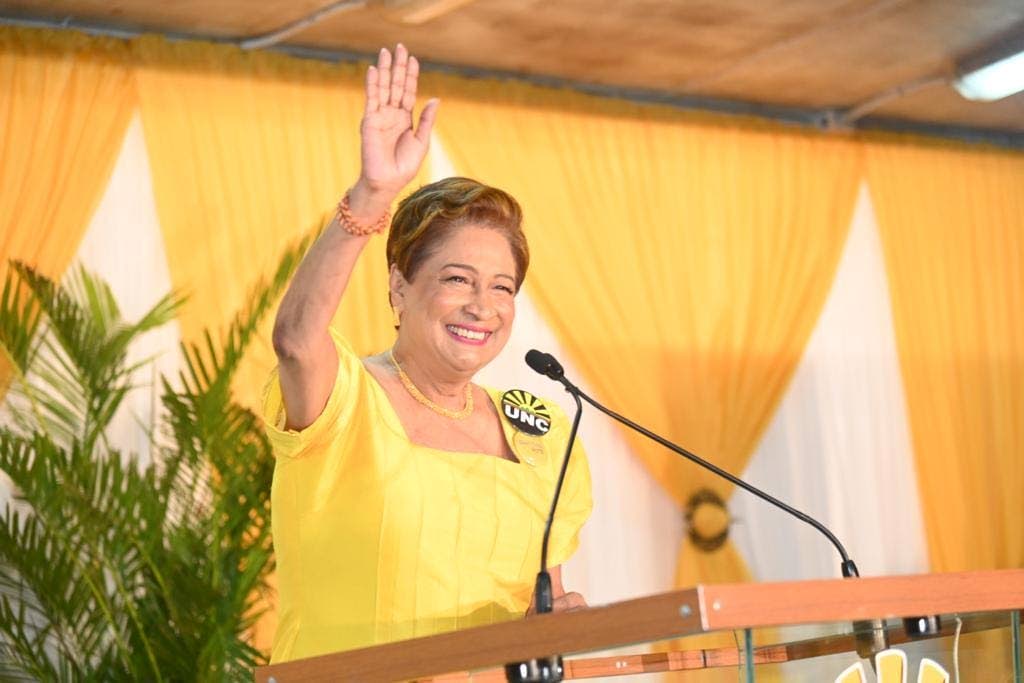UNC accepts PM's invitation to crime talks

OPPOSITION Leader Kamla Persad-Bissessar on Tuesday accepted the Prime Minister’s offer to meet for cross-party crime talks, preferably after the budget debate and after consultation with various stakeholders.
She sent a letter to Dr Rowley plus a list of the UNC’s proposal, including creating a constitutional right to bear arms, creating gated communities, raising the retirement age for police and soldiers, and better treatment of prisoners.
“After receipt of your anti-crime proposals and responses from stakeholders, an agenda can be crafted and a date scheduled for meeting.
“Any progress to be made for our population’s future security and safety requires all of our society to buy into any proposed plans and policies.
She said the fight against crime cannot be guided by biases or emotional responses to praise or criticism.
“It must be guided by clear, compelling, logical, and structured plans operationally implemented by a competent management team drawn from the broadest possible selection of experts.”
Persad-Bissessar lamented that TT was the world’s sixth most violent country, with five years of record murders.
“Our nation is under siege, and the blood of innocents, including our children, flows without end.
“Something must be done to address this horrendous and agonising terror.”
She said despite contrasting constitutional roles, the Prime Minister and Opposition Leader shared unique responsibilities as long-serving national leaders.
“This binds us in an eternal common goal of delivering to our beloved nation and its equally beloved citizenry the best and most faithful service.
Persad-Bissessar said a government’s main role under the Constitution was to protect people’s right to “life, limb and property.”
“This service requires me to be forthright with you. So, I must point out that in your letter, the words ‘criminal elements that are increasingly emboldened’ are the nearest you got to describe a society in the throes of mass murder, home invasions, and gruesomeness never seen before.”
She said when she was PM, serious crimes were brought down to the lowest in decades, but much of that progress was since lost, including removing the Community Comfort Patrols.
Persad-Bissessar said the Opposition’s suggestions to the Government on crime were largely unheeded, yet the Opposition backed 35 of the Government’s anti-crime bills.
Her government had a holistic approach to crime, namely reforming legislation, operational strategies, and social policies, extending beyond policing and legal actions only, she said.
She cited social welfare, healthcare, business development, employment opportunities, and education.
“The proposed meeting will discuss our comprehensive plan with achievable and measurable goals.”
She listed six areas of concern, including management and resource challenges, the first being the “removal of FEH,” seeming to refer to the Minister of National Security.
Secondly, she mentioned legislative deficiencies while proposing new legislation like stand-your-ground and home invasion laws.
Thirdly, she focused on crime prevention and crime rehabilitation strategies “as opposed to 95 per cent of the national security budget allocated to antediluvian crime suppression efforts like limiting bail.”
An appendix to the letter hinted at a proposal to create a constitutional right to bear arms.
“Allowance for the right to bear arms or modifications to the current law to make acquiring firearms by law-abiding citizens easier. The right to self-defence is a human right that needs to be enshrined in our laws and facilitated by Government. We cannot force our citizens to be defenceless or disarmed in the face of serious and constant criminal threats.”
Persad-Bissessar proposed more humane incarceration.
“If you keep a low- or medium-risk person in jail pretrial, you are destabilising them, you are taking away from them the things that made them low-risk to begin with, and that will actually increase their likelihood of committing crime in the future.”
She suggested individualised assessments that consider a defendant’s personal, financial and criminal background to inform bail decisions.
“Five minimum security detention centres based in south, central, north, east and Tobago, with work release during the day and detention after work hours. These facilities will house non-violent offenders who are remanded pretrial and cannot access bail. The locations will make it easier for families to visit their detained loved ones as a person will be placed in the centre closest to their living address.”
She proposed the use of ankle bracelets and house arrest as an alternative to incarceration.
She urged the “financial, psychological and emotional” support of the children of prisoners, a fund for children who had lost both parents to crime, and help with rehabilitation for drug addicts rather than incarceration.


Comments
"UNC accepts PM’s invitation to crime talks"